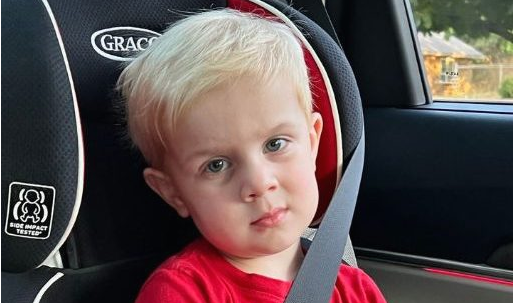A Child’s Honesty That Changed Everything
It was an entirely ordinary drive home—just another quiet afternoon. My son sat in the backseat, eyes locked on his tablet, unusually still. The silence was comforting until it wasn’t. Without warning, he looked up, made eye contact with me, and said something that hit me like a freight train.
“I don’t want you and Dad. I want to live with Grandma and Grandpa.”
At first, I chuckled awkwardly. Surely, he didn’t mean it. Kids say things all the time, right? I assumed it was just a fleeting remark, something he would forget minutes later. But his expression didn’t shift. No giggle, no grin—just a steady, serious gaze. He meant every word.
The Unspoken Reality
I asked him to explain. I needed to hear it from him. And his reasoning? It wasn’t about being spoiled or wanting more screen time. It was something much deeper.
He felt more at ease at his grandparents’ home.
That night, I couldn’t shake the conversation. I sat alone on the couch, TV off, just staring. His words looped in my mind. “I want Grandma and Grandpa.”
I kept trying to rationalize it—maybe I’d said no to candy, maybe he was annoyed about screen time. But no… there was something in his voice that told me this wasn’t about temporary frustration. This was about something larger.

Confirmation in Their Silence
When I brought it up with my parents, their reaction floored me. They didn’t seem shocked—at all. They exchanged a glance like they’d been expecting this. It stung. That look said everything.
And from that moment on, I couldn’t stop thinking about it. I was analyzing every moment in our home. Every disagreement. Every sigh. Every tense silence.
The Brutal Honesty of a Six-Year-Old
The next morning, I brought it up again, gently. Over breakfast, I asked what he meant. His response was immediate, unfiltered, and painfully truthful.
“I like it better there. They don’t yell.”
Then, as casually as anything, he went back to eating his cereal. The words were simple, but they carried so much weight. They cut deeper than any tantrum or meltdown could.
That’s when it all clicked. Our son wasn’t picking them over us because they had better snacks or more toys. He was choosing peace over chaos.
Our Home Through His Eyes
I thought we had hidden our arguments well. But the truth was we had underestimated him. My husband and I had fallen into a pattern—financial stress, daily logistics, disagreements about chores. They seemed like everyday things, but to a child, they were earthquakes.
Later that day, when my husband came home, I told him. His initial response was defensive—like I expected.
“Did you put that in his head?” he asked.
But I explained everything. When I told him our son had said it unprompted, his expression changed. He didn’t say much after that. Just a quiet nod and a heavy sigh.
That night, we went to bed without a word. The silence wasn’t peaceful—it was heavy, filled with things neither of us knew how to say.
A Painful Truth from My Parents
Days later, I went to visit my parents. My son played happily with my dad in the backyard. I pulled my mom aside and confronted her gently.
“Why didn’t you seem surprised when I told you what he said?”
She paused, drying her hands on a towel, then spoke softly:
“Because… we’ve seen how tense things are. He’s calm here. He laughs. He feels safe.”
I wanted to protest. I wanted to say she was exaggerating. But I couldn’t. Because I knew she was right.
Then I asked the question I was really afraid to ask:
“Why did you and Dad look at each other like that?”
She hesitated. Then, finally:
“We’ve just… been worried. That’s all.”
Suddenly, I felt like I wasn’t the parent anymore. I felt like the child. And they were preparing to step in—not because they wanted to, but because they might have to.
A Line in the Sand
A week later, during yet another argument with my husband—this time about bills—we heard a soft voice.
Our son stood in the hallway holding his stuffed dinosaur, eyes full of tears.
“Can you please stop yelling?” he whispered.
The fight ended right there.
It was the clearest signal we could have received. Not a tantrum. Not a scream. Just a quiet plea.
And we heard it.
Taking Action
I suggested therapy. My husband hesitated, of course. But when I reminded him of what our son had said, he gave in. We began counseling.
It wasn’t smooth. The first few sessions were full of tension. But gradually, the air shifted. Our communication changed. We started catching ourselves before things got loud.
It wasn’t a miracle, but it was movement. And that was something.
The Shock That Changed Me Again
Then, one night as I tucked my son in, he said quietly:
“Can I tell you a secret?”
Of course, I said yes.
He leaned in close.
“I already asked Grandma and Grandpa if I could live with them.”
My heart sank.
“And what did they say?”
He responded:
“They said… maybe. If it doesn’t get better.”
I was stunned. My parents—my safety net—had essentially confirmed to him that living with them was a real option.
That night, I called my mom, hurt and angry.
“Why would you say that to him?”
Her response was calm and honest:
“Because he needs to know we’ll always be here. He needs to know he’s safe, no matter what.”
I wanted to yell. But instead, I cried. Because she was right.
Choosing to Heal
I tried to fix it with affection, with treats, with time. But it wasn’t about material things. My son didn’t need more stuff. He needed safety. He needed calm.
Then, my husband surprised me.
“Let’s all spend a weekend at your parents’ house,” he said one morning.
I was stunned.
“Why?”
His reply was simple:
“So he can see us working together—peacefully. Maybe he needs to see that we’re trying.”
We went. And we tried. We helped out around the house, shared meals without snapping, laughed a little. Our son noticed.
That night, he smiled at me and said:
“You and Dad didn’t fight today.”
“No, we didn’t,” I replied.
“Can you keep doing that?” he asked.
That question hit me harder than any therapy session ever could.
Rebuilding Home
Slowly, the air in our home began to change. The yelling faded. The tension eased. We made time for meals together. For laughter. Even for spontaneous living room dance parties.
Then, one evening, my son crawled into bed next to me and whispered:
“I think I want to stay here now—with you and Dad.”
I held him tight.
The Wake-Up Call I Never Expected
Looking back, I realize now—his words in that car weren’t a rejection. They were a lifeline. He wasn’t leaving us behind. He was trying to pull us forward.
Our child didn’t want different parents. He wanted better ones.
And we decided to be them.
My parents didn’t betray me. They were holding us accountable. They were ready to catch our son if we fell too far.
The Message That Stays With Me
Today, our son is lighter, brighter, more at ease. He still loves his grandparents deeply, but he doesn’t feel like he needs to escape our home anymore.
And my husband and I? We’re still learning. Still growing. But now we grow together.
We learned that children don’t want perfection. They want consistency. Peace. Love. And a space that feels safe.
So if you’re a parent reading this, and your child says something that stings—don’t dismiss it. Listen. It might hurt, but it might also save your family.
Because sometimes, the most important lessons come from the smallest voices.



